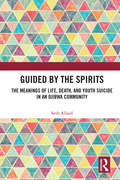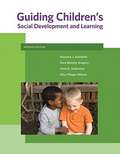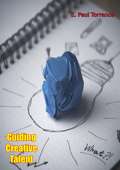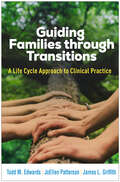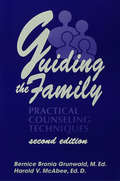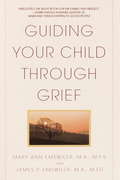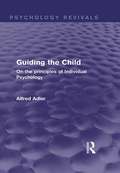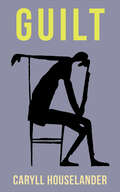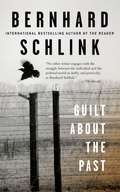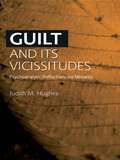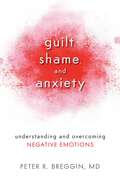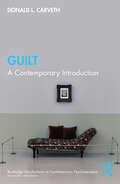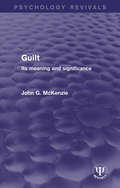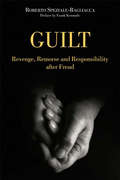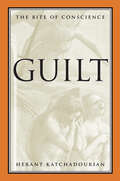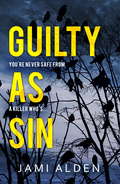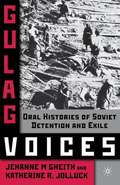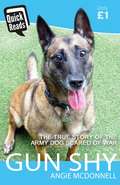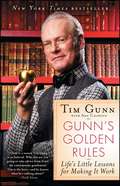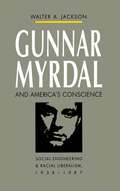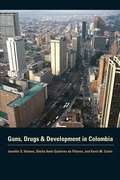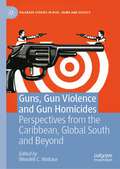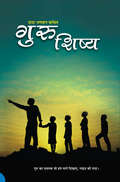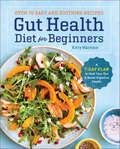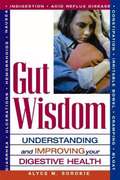- Table View
- List View
Guided by the Spirits: The Meanings of Life, Death, and Youth Suicide in an Ojibwa Community
by Seth AllardGuided by the Spirits is a case study of youth suicide in the Sault Sainte Marie Tribe of Chippewa Indians. Written by a member of the tribal community, this study focuses on qualitative methods, indigenous experience, and collaborative approaches to explore the social and historical significance of youth suicide in an Ojibwa community. Guided by the Spirits combines traditional methods of analysis, extracts of interviews and field notes, and creative ethnographic writing to present the relationships between culture, history, identity, agency, and youth suicide. This book is a must read for lay readers, policy makers, and researchers who seek a window into contemporary Native American life as well as a critical interpretation of youth suicide in indigenous societies.
Guiding Children's Social Development and Learning (Seventh Edition)
by Marjorie Kostelnik Kara Gregory Anne Soderman Alice WhirenGUIDING CHILDREN'S SOCIAL DEVELOPMENT AND LEARNING, Seventh Edition, focuses on ways professionals can help children develop both positive feelings about themselves and social competence. Readers will find practical, developmentally appropriate strategies for how to work with children and families from many different backgrounds and circumstances, and in a variety of group settings. And, they'll obtain a unified framework for decision-making and professional practice that incorporates sound principles of children's development, relationship enhancement, and behavior management.
Guiding Creative Talent
by E. Paul TorranceAnyone with an interest in the problems of highly creative children will find this volume useful in guiding a wide range of creative talent at all age and educational levels. In preparing this material, I have drawn most heavily upon my own research and that of my colleagues concerning the creative thinking of children, adolescents, and adults. Although my emphasis is upon the problems of highly creative children, I believe you will find these materials useful in guiding a wide range of creative talent at all age and educational levels. I have also attempted to give these research findings and observations meaning from my experience as a teacher, counselor, and principal in a high school and as a college teacher and counselor, roles in which I have met many highly creative individuals. I have also drawn upon my research concerning behavior under emergency and extreme conditions, especially situations involving coercion.
Guiding Families through Transitions: A Life Cycle Approach to Clinical Practice
by James L. Griffith Todd M. Edwards JoEllen PattersonAn indispensable clinical resource and text, this book offers therapists evidence-based strategies to support families through life's inevitable transitions. Chapters explore typical life cycle stages--couple formation, parenthood, adolescence, young adulthood and midlife, and later life--and describe treatment principles for frequently encountered family challenges. The book normalizes developmental strains and underscores the significance of flexibility, adaptability, and resilience through adversity. Extensive case examples encompass a range of family forms, cultural and individual differences, and life cycle disruptions, including parental separation, illness, and loss.
Guiding The Family: Practical Counseling Techniques
by Bernice Bronia Grunwald Harold McAbeeFirst published in 1999. Routledge is an imprint of Taylor & Francis, an informa company.
Guiding Your Child Through Grief
by Mary Ann Emswiler James P. EmswilerGive your child the help and support needed to cope with grief and loss. Guiding Your Child Through Grief, by the founders of the New England Center for Loss & Transition and The Cove, a highly praised program for grieving children, takes away the uncertainty and helpless feelings we commonly feel as we reach out to children who mourn. This caring and compassionate guide offers expert advice during difficult days to help a child grieve the death of a parent or sibling. Based on their experience as counselors--and as parents of grieving children--the authors help readers to understand: The many ways children grieve, often in secret Changes in family dynamics after death--and straightforward, effective ways to ease the transition Ways to communicate with children about death and grief How to cope with the intense sorrow triggered by holidays The signs grief has turned to depression--and where to find help And more insights, information, and advice that can help a child heal
Guiding the Child: On the principles of Individual Psychology (Psychology Revivals)
by Alfred AdlerFirst published in 1930 this book was written under the leadership and inspiration of Alfred Adler. He and a group of physicians and educators organized 28 child guidance clinics in Vienna, Berlin and Munich in the years prior to publication. Conducted according to the tenets of Individual Psychology, these clinics revealed many new and stimulating problems that they felt were as applicable to conditions in America and England at the time as in the experimental countries. The book was designed as an organized and connected account of the problems, accomplishments and failures encountered in the daily work, reported from actual experience by the experts in charge. Adler edited the volume and assigned each subject to the specialist in that field. The result was designed to be of value to the welfare worker, the physician, and the forward-looking parent of the time. Today it can be read and enjoyed in its historical context.
Guilt
by Caryll HouselanderDiscover the fascinating work of Caryll Houselander, a lay Catholic artist, mystic, religious writer, and poet in this thought-provoking book. Exploring the concept of guilt in the context of man's relationship with Christ, she reveals how breakdowns in this relationship manifest as psychological disfunction, and argues that only through suffering can we achieve sanity and become whole. Houselander illustrates these arguments through a series of case studies centered around famous authors, artists, and criminals, including as Leopold and Loeb, Teresa Martin, Hans Christian Andersen, and Franz Kafka, With her unique perspective and expertise, Houselander's examination of guilt, suffering, and mental instability is a must-read for anyone interested in the intersection of religion and psychology.
Guilt About the Past
by Bernhard SchlinkThe six essays that make up this compelling book view the long shadow of past guilt as a German experience as well as a global one. International bestselling author Bernhard Schlink explores the phenomenon of guilt and how it attaches to a whole society, not just to individual perpetrators. He considers how to use the lessons of history to motivate individual moral behaviour, how to reconcile a guilt-laden past, the role of law in this process, and how the theme of guilt influences his own fiction. Based on the Weidenfeld Lectures Schlink delivered at Oxford University, Guilt about the Past is essential reading for anyone wanting to understand how events of the past can affect a nation's future, tapping into worldwide interest in the aftermath of war and how to forgive and reconcile the various legacies of the past.
Guilt and Its Vicissitudes: Psychoanalytic Reflections on Morality
by Judith M. HughesHow do psychoanalysts explain human morality?Guilt and Its Vicissitudes: Psychoanalytic Reflections on Morality focuses on the way Melanie Klein and successive generations of her followers pursued and deepened Freud's project of explaining man's moral sense as a wholly natural phenomenon.With the introduction of the superego, Freud laid claim to the study of moral development as part of the psychoanalytic enterprise. At the same time he reconceptualized guilt: he thought of it not only as conscious, but as unconscious as well, and it was the unconscious sense of guilt that became a particular concern of the discipline he was founding. As Klein saw it, his work merely pointed the way. Judith M. Hughes argues that Klein and contemporary Kleinians went on to provide a more consistent and comprehensive psychological account of moral development. Hughes shows how Klein and her followers came to appreciate that moral and cognitive questions are complexly interwoven and makes clear how this complexity prompted them to extend the range of their theory.Hughes demonstrates both a detailed knowledge of the major figures in post-war British psychoanalysis, and a keen sensitivity to the way clinical experience informed theory-building. She writes with vigor and grace, not only about Freud and Klein, but also about such key thinkers as Riviere, Isaacs, Heimann, Segal, Bion and Joseph. Guilt and Its Vicissitudes speaks to those concerned with the clinical application of psychoanalytic theory and to those interested in the contribution psychoanalysis makes to understanding questions of human morality.
Guilt, Shame, and Anxiety: Understanding and Overcoming Negative Emotions
by Peter R. BregginWith the first unified theory of guilt, shame, and anxiety, this pioneering psychiatrist and critic of psychiatric diagnoses and drugs examines the causes and effects of psychological and emotional suffering from the perspective of biological evolution, child development, and mature adult decision-making. Drawing on evolution, neuroscience, and decades of clinical experience, Dr. Breggin analyzes what he calls our negative legacy emotions-the painful emotional heritage that encumbers all human beings. The author marshals evidence that we evolved as the most violent and yet most empathic creatures on Earth. Evolution dealt with this species-threatening conflict between our violence and our close-knit social life by building guilt, shame, and anxiety into our genes. These inhibiting emotions were needed prehistorically to control our self-assertiveness and aggression within intimate family and clan relationships. Dr. Breggin shows how guilt, shame, and anxiety eventually became self-defeating and demoralizing legacies from our primitive past that no longer play any useful or positive role in mature adult life. He then guides the reader through the Three Steps to Emotional Freedom, starting with how to identify negative legacy emotions and then how to reject their control over us. Finally, he describes how to triumph over and transcend guilt, shame, and anxiety on the way to greater emotional freedom and a more rational, loving, and productive life.
Guilt: A Contemporary Introduction (Routledge Introductions to Contemporary Psychoanalysis)
by Donald L. CarvethThis insightful and innovative book sheds light on the complexity of the concept of guilt, while exploring aspects of guilt that have previously been overlooked in psychoanalytic theory and discourse. Offering original insights on the topic, Donald Carveth looks at Freud's failure to distinguish persecutory guilt from reparative guilt, and the superego from the conscience. The significance of these distinctions for both psychosocial theory and clinical practice is explored throughout the volume. Carveth distinguishes varieties of punitive guilt, such as justified, unjustified, "borrowed" or induced, existential and collective. He expertly describes patterns of self-punishment and self-sabotage, while also addressing the widespread use of persecutory guilt and self-punishment as a defence against and evasion of reparative guilt, contrition, and reparation. Throughout the volume, Carveth critically reviews a range of recent contributions to psychoanalytic literature to support his theories. Part of the Routledge Introductions to Contemporary Psychoanalysis series, this book will be of interest to psychoanalysts, psychotherapists, social scientists, and social philosophers, as well as to those studying ethics and theology.
Guilt: Its Meaning and Significance (Psychology Revivals)
by John G. McKenzieIt is acknowledged by most students of human behaviour that the idea of guilt is closely connected with that of man’s freedom and responsibility. It is a theme of law-court and pulpit, a concern of psychoanalysis and probation officers, a growing pre-occupation of the novelist. Our era has even been described as a ‘guilt-consciousness age’. It comes as a surprise, therefore, to discover that there are so few modern books in which the meaning of guilt is thoroughly explored. In the present volume, originally published in 1962, Dr J.G. McKenzie makes an admirable attempt to fill the gap. He begins by describing and analysing the various senses in which the word ‘guilt’ is used and by making a number of important distinctions. There follows a close psychological study of the origin and development of guilty feelings which is illumined by Dr McKenzie’s interpretation of ‘negative’ and ‘positive’ conscience. The author then turns to the legal, ethical and religious concepts of guilt and examines each with care and insight, always raising and facing the deepest issues for both theory and practice. In the concluding section of the book he deals with the question ‘How can the sense of guilt be dissipated?’ Against the backdrop of depth-psychology and theology he offers a penetrating and provocative understanding of divine forgiveness which plumbs the deeps both of man’s sin and of God’s love. Dr McKenzie writes out of a long lifetime of teaching and of clinical work in psychotherapy. The range of his reading and interests is extraordinarily wide. Through all his writing there shines not only his profound concern for people but his lively and indeed infectious conviction that man is still in the making and that his one true Maker is God.
Guilt: Revenge, Remorse and Responsibility After Freud
by Roberto Speziale-BagliaccaGuilt is an original, closely argued examination of the opposition between guilty man and tragic man. Starting from the scientific and speculative writings of Freud and the major pioneers of psychoanalysis to whom we owe the first studies of this complex question, Roberto Speziale-Bagliacca goes on to focus on the debate between Klein and Winnicott in an enlightened attempt to remove blame and the sense of guilt from religion, morality and law. Drawing on an impressive range of sources - literary, historical and philosophical - and illustrated by studies of composers, thinkers and writers as diverse as Mozart and Chuang Tzu, Shakespeare and Woody Allen, Guilt covers a range of topics including the concept of guilt used within the law, and the analyst's contribution to the client's sense of guilt. Previously unavailable in English, this book deserves to be read not only by psychoanalysts, philosophers. scholars and forensic psychiatrists interested in the theory of justice, but also be the ordinary educated reader.
Guilt: The Bite of Conscience
by Herant Katchadourian<div><p class="description"><i>Guilt: The Bite of Conscience</i> is the first book to study guilt from a wide variety of perspectives including those of psychology, psychiatry, psychoanalysis, evolutionary psychology, anthropology, six major religions (Judaism, Christianity, Islam, Hinduism, Buddhism, Confucianism), four key moral philosophers (Aristotle, Kant, John Stuart Mill, and Nietzsche), and the law. Katchadourian first explores the ways in which guilt functions within individual lives and intimate relationships, looking at behaviors that typically induce guilt in both historical and modern contexts. He then turns to the way the capacity for moral judgments develops within the individual lives and through evolutionary processes, taking up both normal and pathological (whether excessive or inadequate) manifestations of guilt.</p> <p class="description">The second part of the book turns to the socio-cultural aspects of guilt. In what ways does religion deal with guilt? Does it compound it or help individuals to resolve it? How do the major religious traditions differ in their conceptions of guilt? Secular alternatives in dealing with guilt are considered in the light of the key moral philosophies that have exerted the most influence in Western cultures. Finally, Katchadourian addresses the ways in which society attempts to come to terms with guilt as culpability through the legal process.</p> <p class="description">This personal work draws from, and integrates, material from extensive primary and secondary literature. It is a reliable guide to what scholars, investigators and clinicians have to say about the topic. Through the extensive use of literary and personal accounts, this book provides an intimate picture of what it is like to experience this universal emotion. While the book is not intended to be a self-help manual, each chapter addresses the issue of how to deal with guilt from a particular point of view. Written in clear and engaging prose, with a touch of humor, Guilt should appeal to a wide audience.</p></div>
Guilty As Sin: Dead Wrong Book 4 (Dead Wrong)
by Jami AldenA sizzling, suspenseful tale, perfect for fans of Melinda Leigh, Kendra Elliot, Karen Rose and Laura Griffin. For over a decade, a killer has been waiting, silent as death and... Guilty As Sin.Fourteen years ago, Kate Beckett was a teenager more interested in summer romance than babysitting. Then the unthinkable happened: her younger brother was kidnapped and murdered on her watch. Now she is an advocate for missing children, and her newest case brings her back to the small town where she lost her brother - and where she left behind the first boy she ever loved. Tommy Ibarra's world fell apart after Kate broke his heart, and he's spent his adult life making sure that he'll never be vulnerable again. When a teenage girl vanishes, he offers his expertise as a high tech security expert to help find her. Although he's determined to keep his distance from Kate, it isn't long before he's falling under her spell all over again. As they race against the clock, their investigation leads to a brutal killer with a shocking connection to Kate's tragic past. And this time, the killer has Kate firmly in his sights.Don't miss more edge-of-the-seat suspense from Jami Alden with her sexy, thrilling novels Beg For Mercy, Hide From Evil and Run From Fear.
Gulag Voices
by Jehanne M Gheith Katherine R. JolluckIn this volume, the powerful voices of Gulag survivors become accessible to English-speaking audiences for the first time through oral histories, rather than written memoirs. It brings together interviews with men and women, members of the working class and intelligentsia, people who live in the major cities and those from the "provinces," and from an array of corrective hard labor camps and prisons across the former Soviet Union. Its aims are threefold: 1) to give a sense of the range of the Gulag experience and its consequences for Russian society; 2) to make the Gulag relevant to English-speaking readers by offering comparisons to historical catastrophes they are likely to know more about, such as the Holocaust; and 3) to discuss issues of oral history and memory in the cultural context of Soviet and post-Soviet society.
Gun Shy: The True Story of the Army Dog Scared of War
by Alison Stokes Angie McDonellVidar, the army search dog, has spent half his life sniffing out enemy weapons and bombs on the front line of the war in Afghanistan. His keen nose saved the lives of hundreds of soldiers, finding roadside bombs which could have killed British troops. But after two years of loyal service, Vidar became ‘Gun Shy’ – a term used to describe dogs who are frightened of loud noises. Whenever he heard bombs exploding or even the sound of helicopters flying above, he would curl up in the corner, shaking with fear.His army days were numbered… and his future looked uncertain. Until Angie, an army medic who befriended him during her tour of Afghanistan, made it her duty to give him a safe haven at her Welsh home.
Gunn's Golden Rules
by Tim GunnOn the runway of life, Tim Gunn is the perfect life coach. You've watched him mentor talented designers on the hit television show Project Runway. Now the inimitable Tim Gunn shares his personal secrets for "making it work"--in your career, relationships, and life. Filled with delightfully dishy stories of fashion's greatest divas, behind-the-scenes glimpses of Runway's biggest drama queens, and never-before-revealed insights into Tim's private life, Gunn's Golden Rules is like no other how-to book you've ever read. In the world according to Tim, there are no shortcuts to success. Hard work, creativity, and skill are just the beginning. By following eighteen tried-and-true principles, you can apply Tim's rules to anything you set your mind to. You'll learn why Tim frowns on displays of bad behavior, like the vitriolic outburst by Martha Stewart's daughter about her mother's name-brand merchandise. You'll discover the downfalls of divadom as he describes Vogue's André Leon Talley being hand-fed grapes and Anna Wintour being carried downstairs by her bodyguards. And you'll get Tim's view on the backstabbing by one designer on Project Runway and how it brilliantly backfired. Then there are his down-to-earth guidelines for making life better--for yourself and others--in small and large ways, especially in an age that favors comfort over politeness, ease over style. Texting at the dinner table? Wearing shorts to the theater? Not in Tim's book. Living a well-mannered life of integrity and character is hard work, he admits, but the rewards are many: being a good friend, being glamorous and attractive, and being a success-- much like Tim himself! He is never one to mince words. But Tim Gunn is always warm, witty, wise, and wonderfully supportive-- just the mentor you need to design a happy, creative, and fulfilling life that will never go out of style.
Gunnar Myrdal and America's Conscience
by Walter A. JacksonGunnar Myrdal's An American Dilemma (1944) influenced the attitudes of a generation of Americans on the race issue and established Myrdal as a major critic of American politics and culture. Walter Jackson explores how the Swedish Social Democratic scholar, policymaker, and activist came to shape a consensus on one of America's most explosive public issues.
Guns, Drugs, and Development in Colombia
by Holmes Jennifer S. Sheila Amin Gutiérrez De Piñeres Kevin M. CurtinFor decades, Colombia has contended with a variety of highly publicized conflicts, including the rise of paramilitary groups in response to rebel insurgencies of the 1960s, the expansion of an illegal drug industry that has permeated politics and society since the 1970s, and a faltering economy in the 1990s. An unprecedented analysis of these struggles, Guns, Drugs, and Development in Colombia brings together leading scholars from a variety of fields, blending previously unseen quantitative data with historical analysis for an impressively comprehensive assessment. Culminating in an inspiring plan for peace, based on Four Cornerstones of Pacification, this landmark work is sure to spur new calls for change in this corner of Latin America and beyond.
Guns, Gun Violence and Gun Homicides: Perspectives from the Caribbean, Global South and Beyond (Palgrave Studies in Risk, Crime and Society)
by Wendell C. WallaceThis book provides in-depth coverage of guns, gun violence and gun homicides from a variety of perspectives, including, but not limited to, gender, suicide, peaceology and police (in)action. Reflecting changes in contemporary perceptions as well as desires for scholarship emanating from under-researched areas of the globe, this book addresses the pervasive issue of guns, gun violence and gun homicides. Authored by a wide range of Social Science experts, and premised on the notions of epistemological diversity, inclusivity and knowledge production in the Global South, this book provides comprehensive coverage on the nebulous concern of guns and their destructive force using differing approaches to the same problem, with a focus on prevention/reduction of gun violence. Readers may find the chapters contained in this book to be fascinating, provocative, informative, clearly presented and solution oriented. This book is of special interest to students, criminologists, policymakers, criminal justice system officials and laypersons. It is invaluable to policymakers at differing levels of government who provide advice on the social issue of guns and gun violence in their respective jurisdictions.
Guru Shishya: गुरु शिष्य
by Dada Bhagwanलौकिक जगत् में बाप-बेटा, माँ-बेटी, पति-पत्नी, वगैरह संबंध होते हैं। उनमें गुरु-शिष्य भी एक नाजुक संबंध है। गुरु को समर्पित होने के बाद पूरी ज़िंदगी उसके प्रति ही वफादार होकर, परम विनय तक पहुँचकर, गुरु की आज्ञा के अनुसार साधना करके, सिद्धि प्राप्त करनी होती है। लेकिन सच्चे गुरु के लक्षण और सच्चे शिष्य के लक्षण कैसे होते हैं ? उसका सुंदर विवेचन इस पुस्तक में प्रस्तुत किया गया है। गुरुजनों के लिए इस जगत् में विविध मान्यताएँ प्रवर्तमान है। तब ऐसे काल में यथार्थ गुरु बनाने के लिए लोग उलझन में पड़ जाते हैं। यहाँ पर ऐसी ही उलझनों के समाधान दादाश्री ने प्रश्नकर्ताओं को दिए है। सामान्य समझ से गुरु, सदगुरु और ज्ञानीपुरुष –तीनों को एक साथ मिला दिया जाता है। जब कि परम पूज्य दादाश्री ने इन तीनों के बीच का एक्ज़ेक्ट स्पष्टीकरण किया है। गुरु और शिष्य –दोनों ही कल्याण के मार्ग पर आगे चल सके, उसके लिए तमाम दृष्टीकोणों से गुरु-शिष्य के सभी संबंधों की समझ, लघुतम फिर भी अभेद, ऐसे ग़ज़ब के ज्ञानी की वाणी यहाँ संकलित की गई है।
Gut Health Diet for Beginners: A 7-Day Plan to Heal Your Gut & Boost Digestive Health
by Kitty MartoneReset your gut and boost digestive health in 7-days with a clear meal plan, guidance, and recipes from the Gut Health Diet for Beginners.Gut health is essential to whole body health. Offering the quickest plan to cleanse your microbiome, Gut Health Diet for Beginners kick-starts your gut healthy diet to promote digestive health and healing in 7-days.From day one, this general gut health diet eliminates the guesswork of starting a new eating regimen with useful guidance, shopping lists, and preparation guides. With a clear meal plan—featuring 75 easy, 5-ingredient recipes that you can choose from—Gut Health Diet for Beginners is a fast and effective solution to find out if your body would benefit from following a gut healthy diet.Gut Health Diet for Beginners includes:Gut health 101 that explains how gut health affects your overall health, and outlines foods to enjoy and avoid to maximize results.7-day meal plan that includes 75 clean and easy, 5-ingredient recipes with shopping lists and prep guides for every week.5-steps for success that eliminate the stress of starting a new diet by guiding you through kitchen and pantry prep, meal prep and planning, symptom tracking, plus healthy habits to pursue alongside the diet.A guide for next steps that helps you select the best diet for your gut health once you've completed the 7-day diet.Whether you decide to continue a general gut health diet or commit to GAPS, AIP, or a low-FODMAP diet, Gut Health Diet for Beginners is your introduction to a lifetime of gut healthy eating.
Gut Wisdom: Understanding and Improving Your Digestive Health
by Alyce M. SorokieA positive mental attitude is everything, and this inspirational as well as informative guide to good tummy health is fairly brimming with it. Sorokie, who owns her own holistic health center in Chicago and teaches "gut wisdom" workshops, offers a complete instructional rundown, from diseases to diets, in her effort to make all people realize "your gut 'knows' what you need." She explains why not to ignore the signs and signals your gut is giving you about your digestive health and how not to ignore its messages--meaning, what to do about the information you are receiving, in terms of what to put into your mouth and what not to. Her user-friendly format permits easy consultation about a specific problem, and her warm tone encourages reading the book straight through, as a "journey," as the author calls it.
